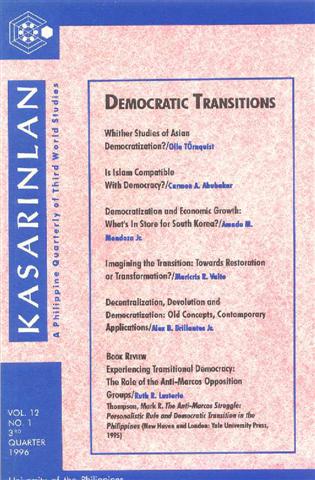Decentralization, Devolution and Democratization: Old Concepts, Contemporary Applications
Abstract
With the adoption of the 1987 Constitution and the enactment of the Local Government Code in 1992, the beginnings of a power shift have occurred. Lower level political institutions have been given power under a decentralized politico-administrative set-up, thus widening the base for participation in governance and making the political system more open and accessible than ever before. A review of Philippine history shows that decentralization— which may take the forms deconcentration, devolution, and debureaucratization—is not a new phenomenon. Values of autonomy and decentralization have long been recognized, at least, at the level of policy and rhetoric. Under the new Code, decentralization has been adopted both as an approach to governance and a strategy to bring about, or even hasten, the process of democratic transition. While the Code’s enactment can be considered as a fitting culmination of decades if struggle for the genuine autonomy on the part of the local governments, the creative energies of local governments, unleashed by the radical decentralization powers by the Code, must still be collectively harnessed if the transition to real democracy is to be completed.
Published
2008-06-02
How to Cite
BRILLANTES, Alex B..
Decentralization, Devolution and Democratization: Old Concepts, Contemporary Applications.
Kasarinlan: Philippine Journal of Third World Studies, [S.l.], v. 12, n. 1, june 2008.
ISSN 2012-080X.
Available at: <https://journals.upd.edu.ph/index.php/kasarinlan/article/view/849>. Date accessed: 17 sep. 2025.
Section
Features
By submitting a manuscript, the authors agree that the exclusive rights to reproduce and distribute the article have been given to the Third World Studies Center.



